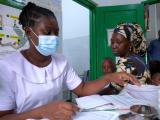A new report from UNICEF and the World Health Organization (WHO) said that, globally, 10% of infants under the age of 12 months did not receive any vaccinations in 2016. These estimates suggest that 12.9 million children missed their first dose of diphtheria-tetanus-pertussis (DTP)-containing vaccine. Another 6.6 million infants who did receive their first dose of DTP did not complete the full 3-dose DTP schedule in 2016. These findings and others are published in a new report, State of inequality: Childhood immunization.
The WHO estimates that immunization prevents between 2 to 3 million childhood deaths every year from diphtheria, tetanus, whooping cough, and measles.
"Most of the children that remain un-immunized are the same ones missed by health systems," said Jean-Marie Okwo-Bele, MD, director of immunization, vaccines and biologicals at WHO, in a press release. "These children most likely have also not received any of the other basic health services. If we are to raise the bar on global immunization coverage, health services must reach the unreached. Every contact with the health system must be seen as an opportunity to immunize."
Conflict adds to vaccination challenges
One of the targets of the WHO's Global Vaccine Action Plan is to achieve 90% DTP coverage (all 3 doses of the vaccine) worldwide. To date, only 130 out of the 164 member states have reached that percentage. For the last 7 years, the percentage of DTP coverage has stalled at 86%.
In 2016, eight countries, Central African Republic, Chad, Equatorial Guinea, Nigeria, Somalia, South Sudan, Syria, and Ukraine, reported DTP coverage of less than 50%.
Of the 12.9 million unvaccinated children worldwide, an estimated 7.3 million live in countries affected by conflict. Of those, 4 million live in Afghanistan, Nigeria, and Pakistan. Access to vaccines in these countries has proven challenging, as these are also the last three countries with wild poliovirus transmission.
Overall, middle income and wealthier nations had better vaccine coverage in 2016, but still lagged when it came to newer vaccines. The rotavirus vaccine, for example, has yet to reach 50% global coverage.
US teens miss vaccines
In other vaccine coverage news, a new survey conducted by the University of Michigan showed that one-third of US parents did not know their teenager's vaccine schedule and status.
The survey, part of the C.S. Mott Children's Hospital National Poll, asked 614 parents of children ages 13 to 17 years old when their child was due for their next vaccine. A total of 36% said didn't know.
Researchers said that well-child visits drop away as children age, and parents are much less likely to keep track of common vaccination schedules once a child reaches middle school. And, unlike elementary school, few high schools send home reminders or fact-sheets about immunizations.
Researchers said all parents should know that teens are recommended to receive a booster shot of meningococcal vaccine at 16, annual influenza vaccines, a tetanus, diphtheria, and pertussis (TDAP) booster, and the human papillomavirus (HPV) vaccine.
See also:
July 17 WHO press release
July 17 University of Michigan story




















